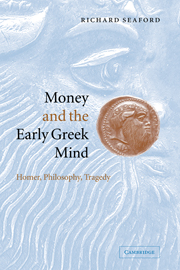Book contents
- Frontmatter
- Contents
- Preface
- List of abbreviations
- 1 Introduction
- PART ONE THE GENESIS OF COINED MONEY
- 2 Homeric Transactions
- 3 Sacrifice and distribution
- 4 Greece and the ancient Near East
- 5 Greek money
- 6 The preconditions of coinage
- 7 The earliest coinage
- 8 The features of money
- PART TWO THE MAKING OF METAPHYSICS
- References
- Index
2 - Homeric Transactions
Published online by Cambridge University Press: 22 September 2009
- Frontmatter
- Contents
- Preface
- List of abbreviations
- 1 Introduction
- PART ONE THE GENESIS OF COINED MONEY
- 2 Homeric Transactions
- 3 Sacrifice and distribution
- 4 Greece and the ancient Near East
- 5 Greek money
- 6 The preconditions of coinage
- 7 The earliest coinage
- 8 The features of money
- PART TWO THE MAKING OF METAPHYSICS
- References
- Index
Summary
FORMS OF ECONOMIC TRANSACTION IN HOMER
Before looking for money functions in Homeric society, I will list the various kinds of transaction (in the broad sense) by which goods are allocated. I list them in roughly ascending order of the extent to which they approximate to trade, defined for our present purpose as the impersonalinstantaneous exchange of goods equivalent in value, so that the final category is the full embodiment of such exchange.
First we register allocation by violence, as when Odysseus and his followers take from the city of the Ciconians ‘their wives and many possessions’ (Od. 9.41), in which no exchange is involved.
Prizes, notably those offered by Achilles at the funeral games of Patroclus. No exchange is involved, except in so far as the prize may be in return for the honour done to Achilles or Patroclus by participation in the games.
Gifts are – depending on the context – usually given rather than exchanged, although we also find statements of the expectation that a gift will be followed eventually by a gift or benefit in return. As is the case in most societies, precise equivalence of value and enforceable immediacy of return have no place in the exchange of gifts. Gifts may bestow prestige, and may initiate and sustain alliances between powerful individuals. And so for example Odysseus, given a bow by Iphitus, gives him in turn a sword and spear as ‘the beginning of guest-friendship’ (Od. 21.35), and Hector and Ajax exchange gifts in order to establish ‘friendship’ (Il. 7.302). […]
- Type
- Chapter
- Information
- Money and the Early Greek MindHomer, Philosophy, Tragedy, pp. 23 - 47Publisher: Cambridge University PressPrint publication year: 2004



